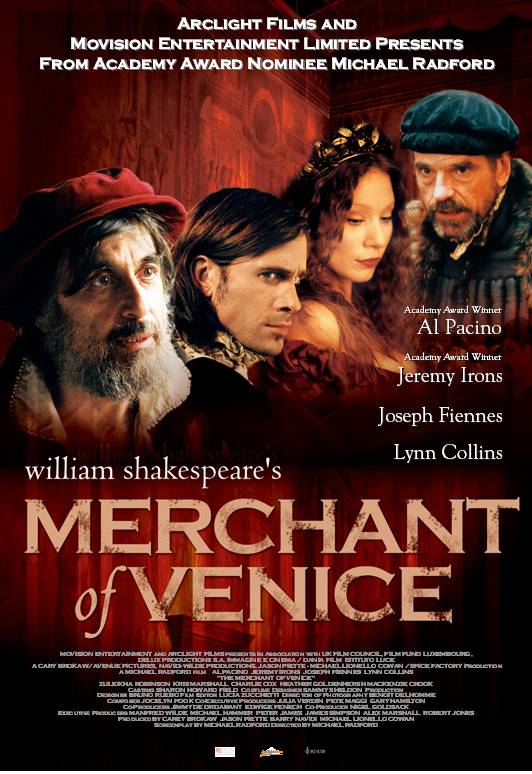|

Director Michael Radford’s accomplished adaptation
of Shakespeare’s “The Merchant of Venice” mines the humour of its source material with an expert hand. But
the play – fuelled by passion, intergenerational misunderstanding, hypocrisy, religious intolerance and entrapment –
is also a complex and disturbing work and this fiery retelling blazes with a visceral sense of atmosphere and profoundly evocative
characterizations by Al Pacino, Jeremy Irons and Joseph Fiennes.
In the powerful and putatively liberal city state
of Venice – which Radford depicts as a rainy, smouldering maze – Shylock (Pacino) has grown wealthy through the
“abomination” of moneylending and faces indignity or danger when he ventures beyond the Jewish quarter. In the
same city, though in a different world, lives Antonio (Irons), a Christian merchant beset by worry over the fate of his trading
vessels and his increasing isolation from his best friend Bassanio (Fiennes). The younger man has fallen in love with the
beautiful Portia (emerging star Lynn Collins) and seeks to go abroad to win her hand. When Antonio, cash-strapped but still
possessed of good credit, stakes Bassanio for a loan of three thousand ducats from Shylock, a bond is sealed, the risk of
which is one pound of Antonio’s flesh.
The performances are exceptional: there is splendid chemistry between
Fiennes and Collins, while Kris Marshall (familiar to Festival audiences as “Colin, God of Sex” in last year’s
Love Actually) exudes great aplomb as Bassanio’s friend Gratiano. Surrounding his Antonio with an aura of abject
exhaustion, Irons (who also stars in the Festival’s Opening Night Gala, Being Julia) portrays a merchant overshadowed
by morbidity from the start, and Pacino brings tremendous resonance to the intricate role of Shylock, who suffers loss upon
loss before reaching his breaking point.
Careful to maintain the plot’s comic subterfuge, cross-dressing and
last-minute reversals, Radford also draws out the significantly contrasting moods of the last act. There is much sexiness
and romance in the quintessentially Shakespearean double marriage, but still more resonant are Antonio’s loneliness
as he is brushed aside by the newlywed Bassanio, and Shylock’s final, tragic exile from his faith and his community.
|

